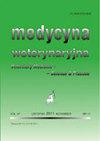Malaria detection using custom Semantic Segmentation Neural Network Architecture
IF 0.4
4区 农林科学
Q4 VETERINARY SCIENCES
Medycyna Weterynaryjna-Veterinary Medicine-Science and Practice
Pub Date : 2023-01-01
DOI:10.21521/mw.6804
引用次数: 0
Abstract
Malaria is a significant disease that affects both animals and humans. The four main Plasmodium species that cause human malaria are Plasmodium falciparum, Plasmodium vivax, Plasmodium malariae, and Plasmodium ovale. Plasmodium knowlesi, a parasite typically infecting forest macaque monkeys, was recently revealed to be able to be transmitted by anophelines and provoke malaria in humans. This provides an increasing risk of spreading the disease to areas previously unaffected with it and infecting people during the increasingly popular travels abroad. Microscopic examination remains one of the most often used methods for its laboratory confirmation. These tests, however, should be performed immediately after receiving samples from a firstcontact doctor to allow immediate therapy. This research presents a novel, semantic segmentation neural network architecture designed to quickly create a classification mask, giving the doctor information about the position, shape, and possible affiliation of detected elements. The evaluation method is based on a light microscope imagery and was created to overcome problems resulting from the human diagnosis specifics. There are 3 abstract classes containing healthy cells, cells with malaria and background. The outputted mask can be later mapped to a more readable form with the inclusion of contrasting colors, next to an original image for quick validation. Such an approach allows for semi-automatic recognition of possible disease, nevertheless still giving the final verdict to the specialist. The developed solution has achieved a high recognition accuracy of 96.65%, while the computer power requirements are kept at a minimum. The proposed solution can help reduce misclassification rates by providing additional data for the doctor and speed up the entire process with the early diagnosis made by a deep learning model.基于自定义语义分割神经网络架构的疟疾检测
疟疾是一种影响动物和人类的重大疾病。导致人类疟疾的四种主要疟原虫是恶性疟原虫、间日疟原虫、疟疾疟原虫和卵形疟原虫。诺氏疟原虫是一种通常感染森林猕猴的寄生虫,最近发现它能够通过按蚊传播,并在人类中引起疟疾。这增加了将疾病传播到以前未受影响地区的风险,并在日益流行的出国旅行期间感染人们。显微镜检查仍然是实验室确认的最常用方法之一。然而,这些检测应在从首次接触者医生处收到样本后立即进行,以便立即治疗。本研究提出了一种新的语义分割神经网络架构,旨在快速创建分类掩码,为医生提供有关检测元素的位置,形状和可能关联的信息。该评价方法基于光学显微镜图像,是为了克服由人类诊断细节引起的问题而创建的。有3个抽象类,包含健康细胞、疟疾细胞和背景细胞。输出的掩码稍后可以映射为更具可读性的形式,包含对比色,在原始图像旁边进行快速验证。这种方法允许半自动识别可能的疾病,但仍将最终判决交给专家。该方案在对计算机功耗要求最低的情况下,实现了96.65%的识别准确率。提出的解决方案可以通过为医生提供额外的数据来帮助减少误分类率,并通过深度学习模型进行早期诊断来加快整个过程。
本文章由计算机程序翻译,如有差异,请以英文原文为准。
求助全文
约1分钟内获得全文
求助全文
来源期刊

Medycyna Weterynaryjna-Veterinary Medicine-Science and Practice
VETERINARY SCIENCES-
CiteScore
0.80
自引率
0.00%
发文量
73
审稿时长
4-8 weeks
期刊介绍:
"Medycyna Weterynaryjna" publishes various types of articles which are grouped in the following editorial categories: reviews, original studies, scientific and professional problems, the history of veterinary medicine, posthumous memoirs, as well as chronicles that briefly relate scientific advances and developments in the veterinary profession and medicine. The most important are the first two categories, which are published with short summaries in English. Moreover, from 2001 the editors of "Medycyna Weterynaryjna", bearing in mind market demands, has also started publishing entire works in English. Since 2008 the periodical has appeared in an electronic version. The following are available in this version: summaries of studies published from 1999 to 2005, full versions of all the studies published in the years 2006-2011 (in pdf files), and full versions of the English studies published in the current year (pdf). Only summaries of the remaining studies from the current year are available. In accordance with the principles accepted by the editors, the full versions of these texts will not be made available until next year.
All articles are evaluated twice by leading Polish scientists and professionals before they are considered for publication. For years now "Medycyna Weterynaryjna" has maintained a high standard thanks to this system. The review articles are actually succinct monographs dealing with specific scientific and professional problems that are based on the most recent findings. Original works have a particular value, since they present research carried out in Polish and international scientific centers.
 求助内容:
求助内容: 应助结果提醒方式:
应助结果提醒方式:


